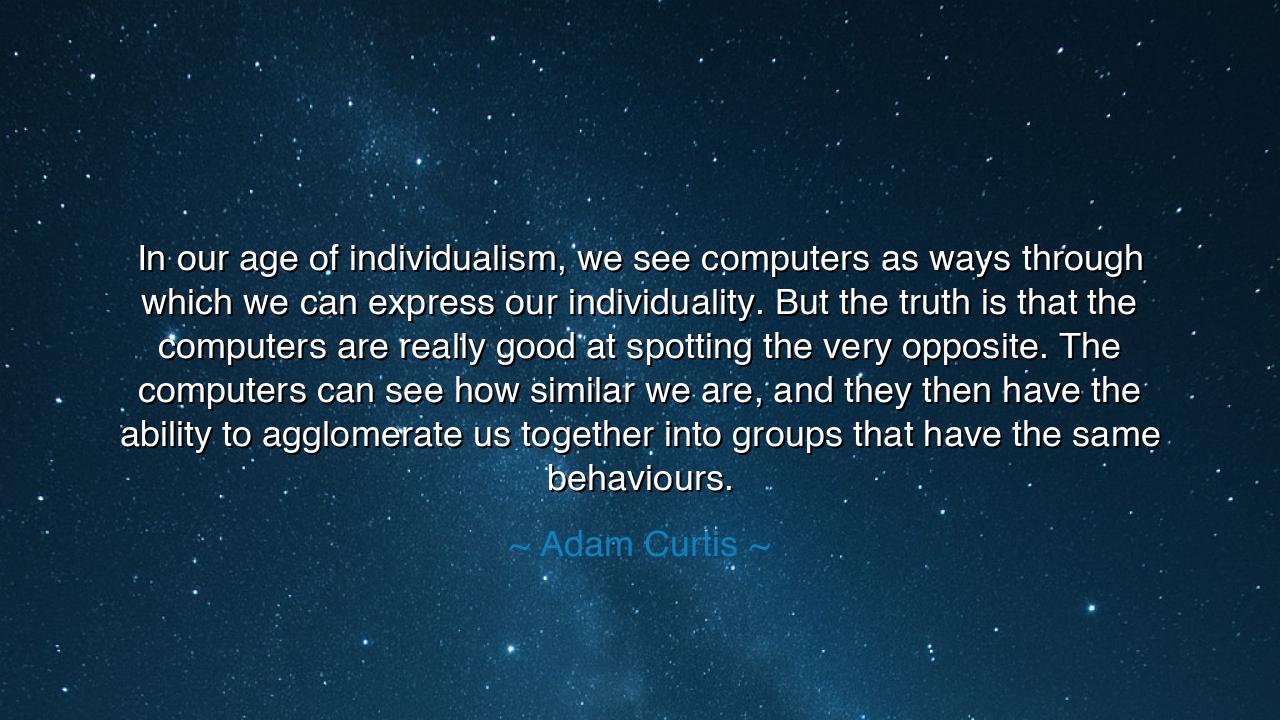
In our age of individualism, we see computers as ways through
In our age of individualism, we see computers as ways through which we can express our individuality. But the truth is that the computers are really good at spotting the very opposite. The computers can see how similar we are, and they then have the ability to agglomerate us together into groups that have the same behaviours.






"In our age of individualism, we see computers as ways through which we can express our individuality. But the truth is that the computers are really good at spotting the very opposite. The computers can see how similar we are, and they then have the ability to agglomerate us together into groups that have the same behaviours." – Adam Curtis
In the age of the individual, where each person is seen as a unique being, an expression of their own thoughts, desires, and dreams, the computer has come to symbolize the pinnacle of personal freedom. We use these tools to carve out our own digital identities, to share our lives, our art, our opinions, and our truths with the world. Yet, in the wisdom of Adam Curtis, we find a profound paradox. These very tools, which we see as extensions of our individuality, are not simply passive vessels for our self-expression. Instead, they are powerful enough to detect our similarities, to organize us into groups, to homogenize our behavior and thoughts into patterns that reveal more about our shared humanity than our individuality. In the face of this revelation, the truth becomes clear: the very tools we use to express our uniqueness are also the ones that bind us together, shaping us into more predictable, more controllable beings.
This paradox is not new. In the ancient world, individuality was celebrated but also often constrained by the larger societal order. The great philosophers—Plato, Aristotle, and others—spoke of the importance of the individual’s pursuit of virtue, wisdom, and self-realization. Yet even in their time, they understood that human beings are part of something greater. Plato’s Republic spoke of the need for harmony between the individual and the state, for society to function properly. While the individual was important, the larger society shaped their destiny, guiding their actions. In a sense, the ancient world, while recognizing the uniqueness of the individual, was also very much about the integration of individuals into a collective whole. And this is precisely the dynamic that Curtis alludes to today: we may think we are expressing our individual selves through technology, but in reality, we are being reduced to groups, systems, and patterns of behavior.
Consider the story of the rise of the alphabet, a breakthrough in communication that allowed for the individual to leave behind written records of thought and reflection. This seemingly revolutionary act of self-expression—writing—began as a way to record personal history, the thoughts of individuals. However, as societies began to use this system more, writing also served to organize and standardize communication across vast empires, often reducing the richness of individual expression into mere functional records of law, trade, and administration. In a similar way, our digital lives, intended to express our individuality, become part of a greater system that categorizes, analyzes, and organizes us into groups of shared behaviors, interests, and patterns. The individual is subsumed, much as written language subsumed oral tradition, into a new system that defines our reality.
This evolution is reflected in the rise of social media, where each person is encouraged to create a digital persona, to express their uniqueness. But what Curtis points out is the irony that while these platforms seem to promote individuality, they are, in fact, highly adept at sorting us into patterns. The algorithms that drive these platforms identify shared behaviors, preferences, and ideas, grouping us into communities that often reinforce our existing beliefs and actions. Far from celebrating our uniqueness, these digital systems capitalize on the similarities between us, amplifying them and reducing the diversity of thought. The digital age, much like the written word in ancient times, has found a way to organize us—not just physically, but mentally.
The lesson here is one of awareness. Just as Plato and the philosophers of old recognized the tension between the individual and the collective, we must now navigate the tension between our desire to express our individuality and the forces that work to categorize and standardize us. The modern world, with its vast technological systems, offers us the illusion of freedom and self-expression, but we must be mindful that these systems also have the power to shape and direct our behavior. The question is not whether we are individuals, but how much of our individuality is shaped by forces beyond our control.
Thus, we must ask ourselves: how can we remain true to our individuality in a world that seeks to categorize and group us? It begins with awareness—recognizing the systems at play in our digital lives, understanding how our data is being collected, and seeking out ways to disrupt the patterns that limit our freedom. We must take conscious steps to protect the diversity of thought and creativity that makes us uniquely human, even as we engage with technology. The lesson of Curtis' words is a reminder that the pursuit of individuality is not just a personal endeavor, but a collective responsibility to preserve the essence of who we are amidst the growing influence of the digital world. In this age of technology, we must strive not just to express ourselves, but to remain aware of how we are being shaped, to ensure that our freedom is not lost in the very systems that promise to empower us.






AAdministratorAdministrator
Welcome, honored guests. Please leave a comment, we will respond soon